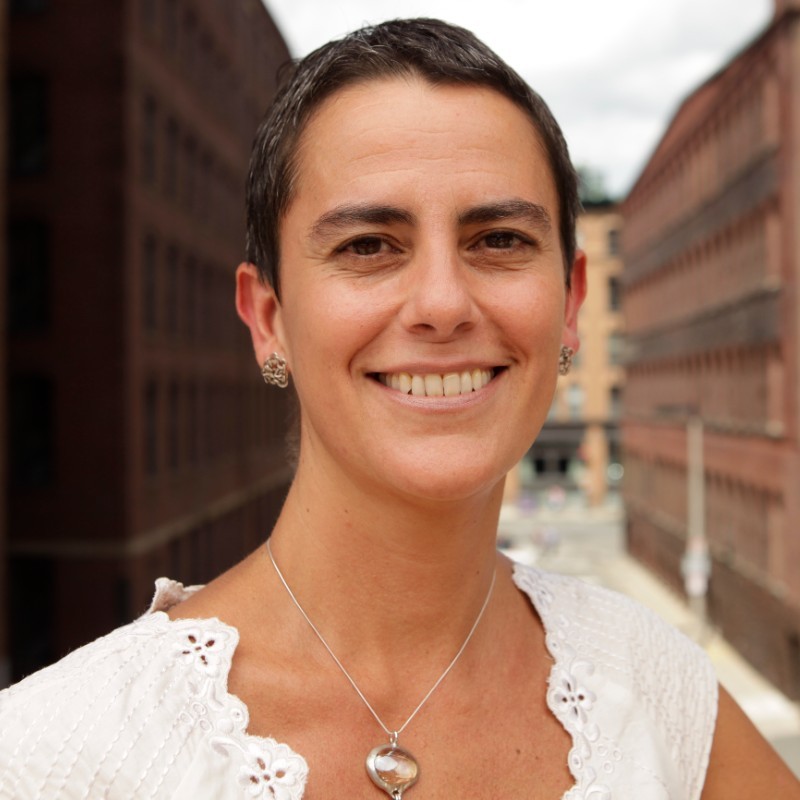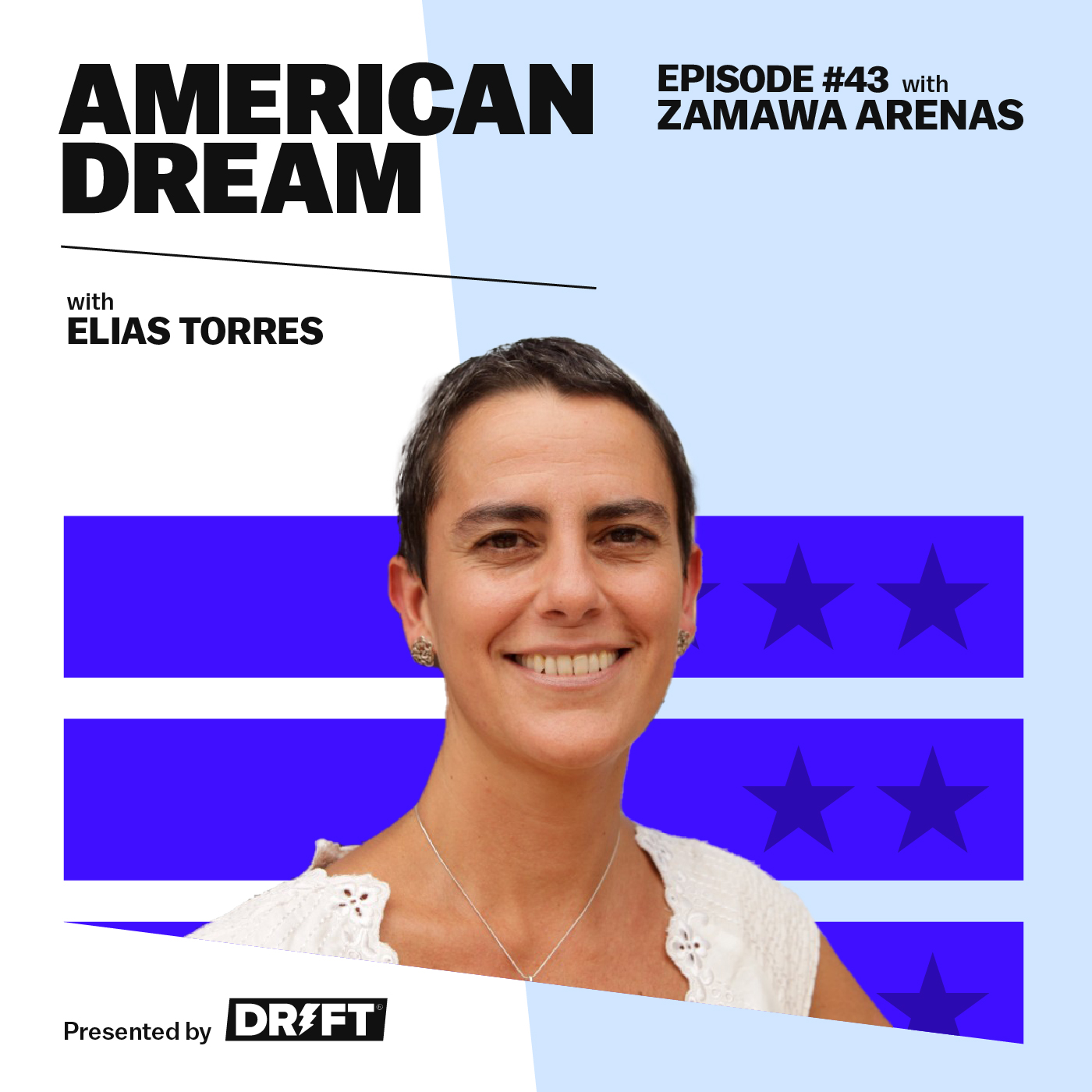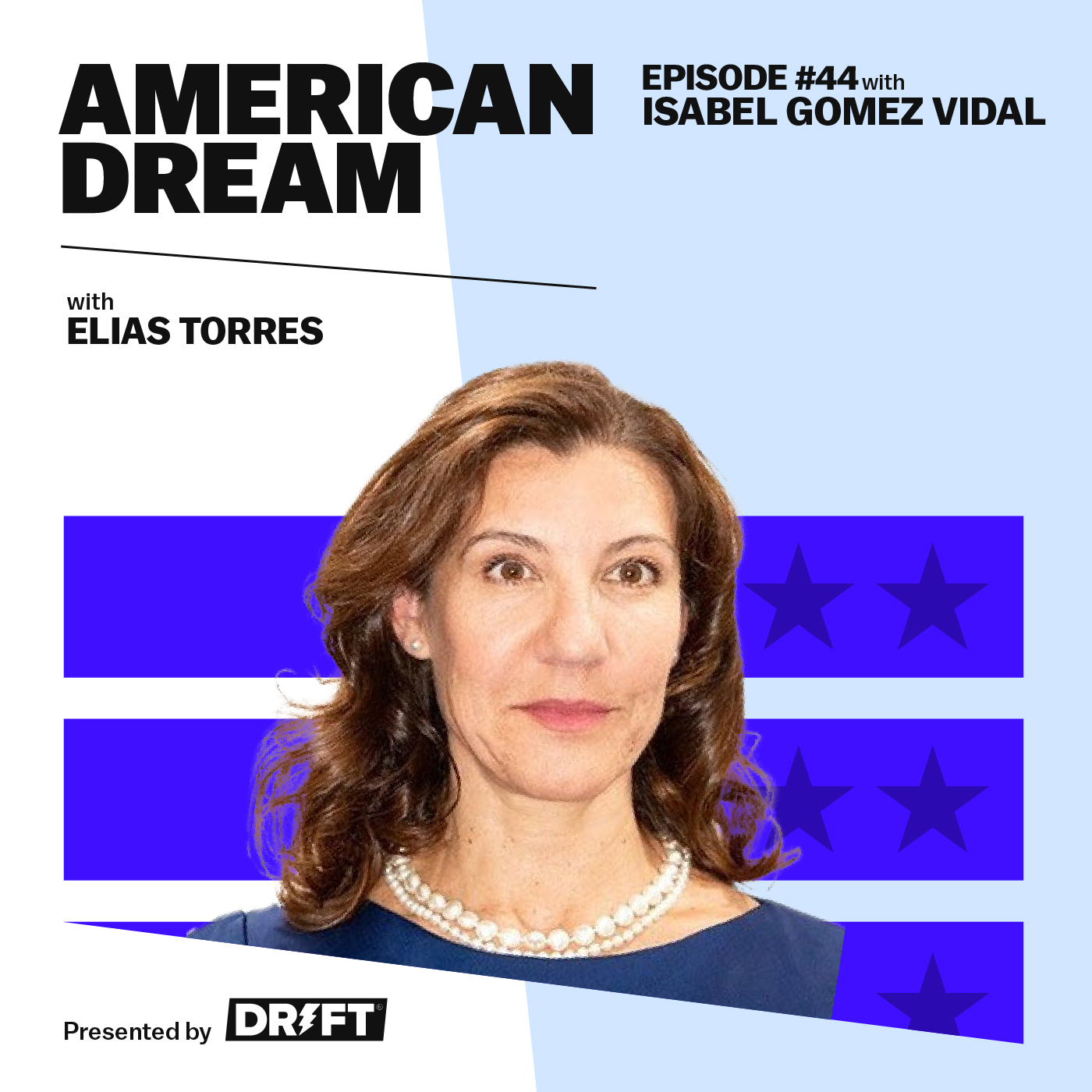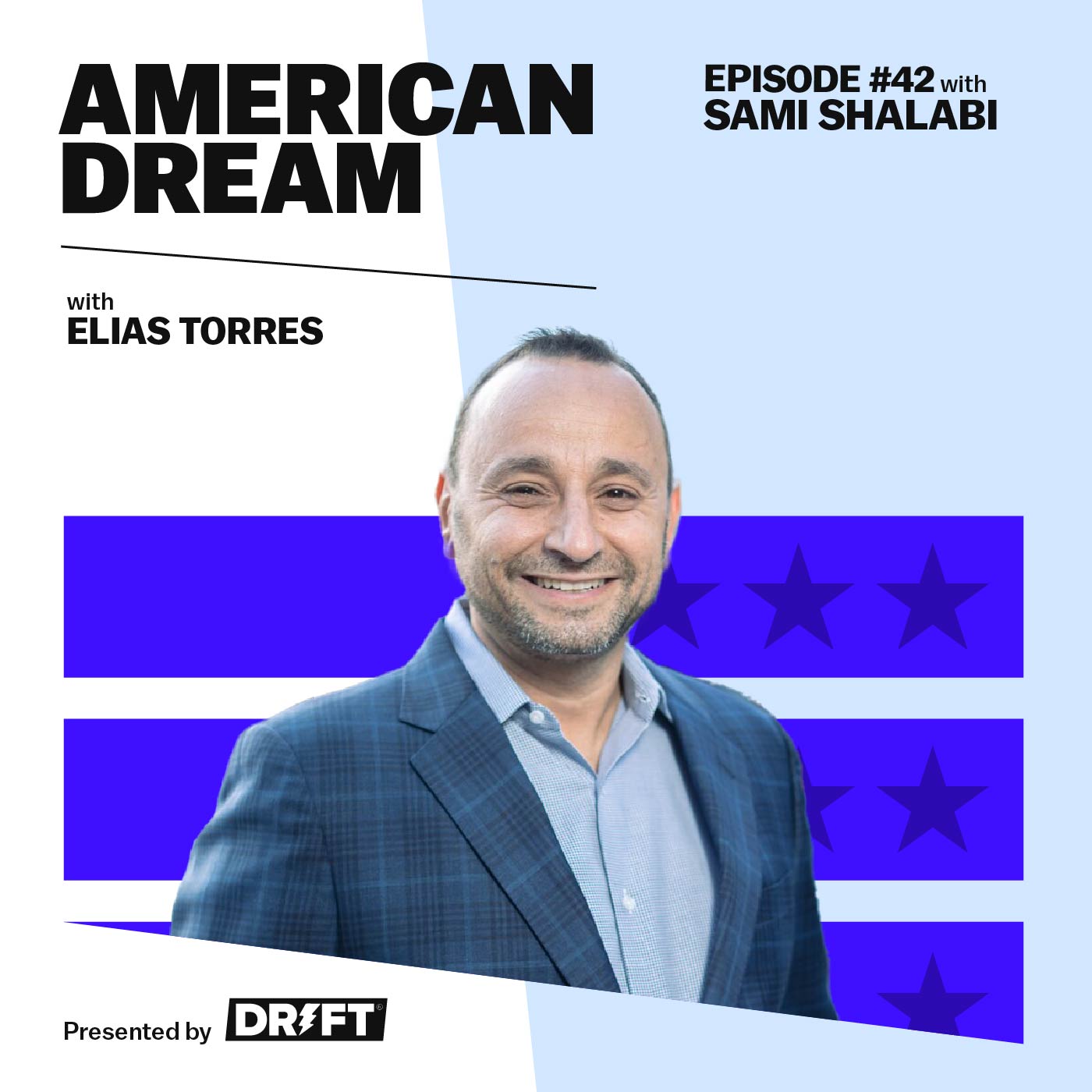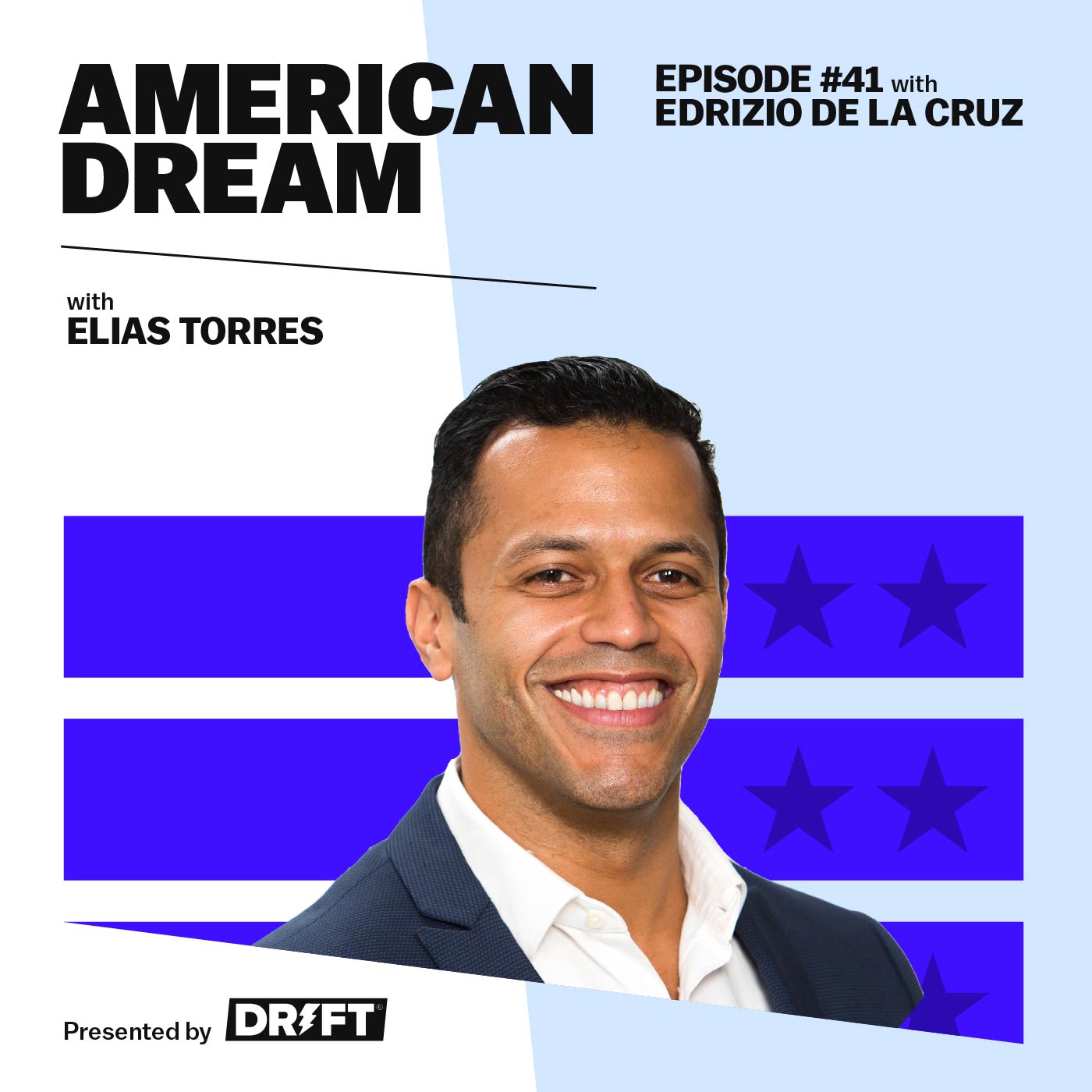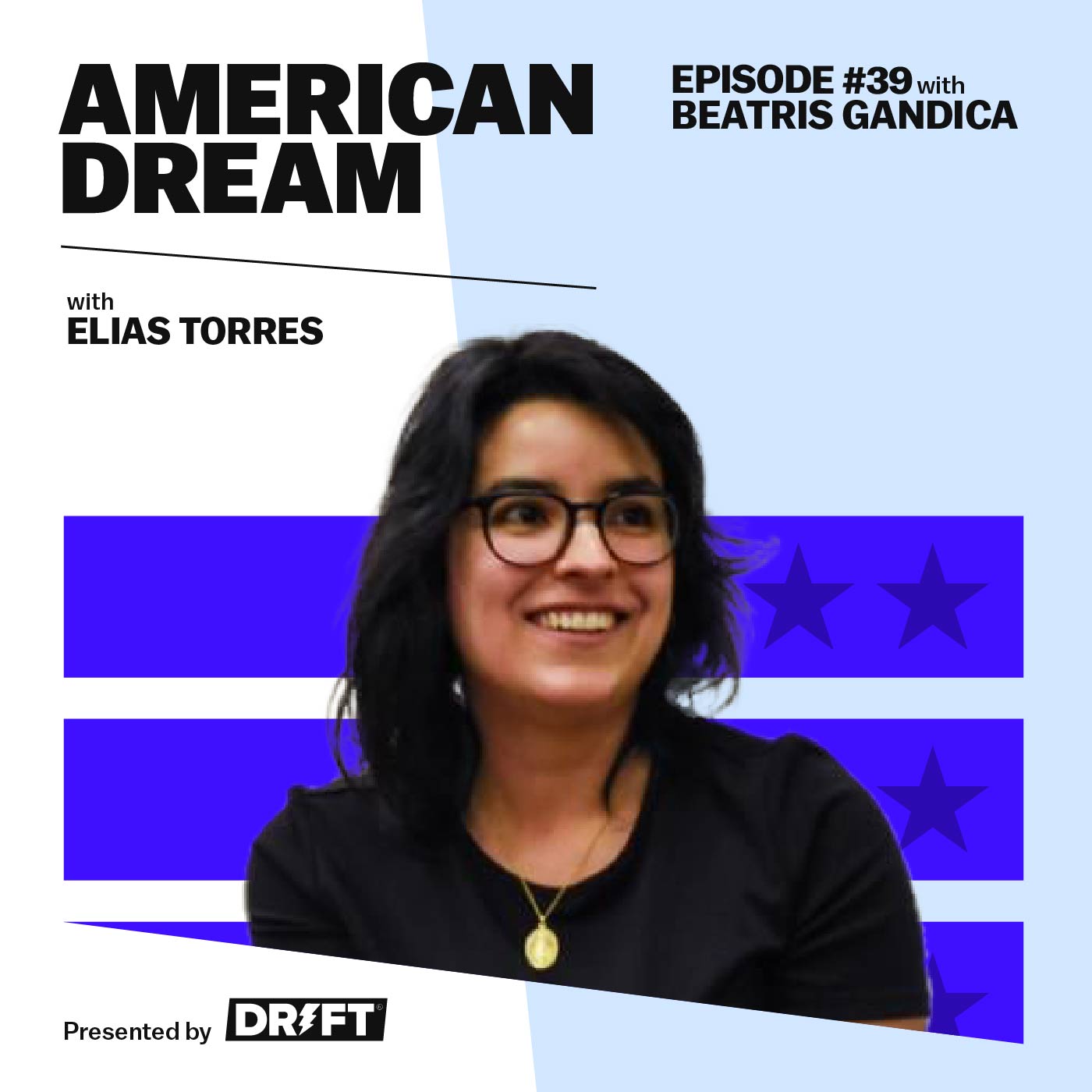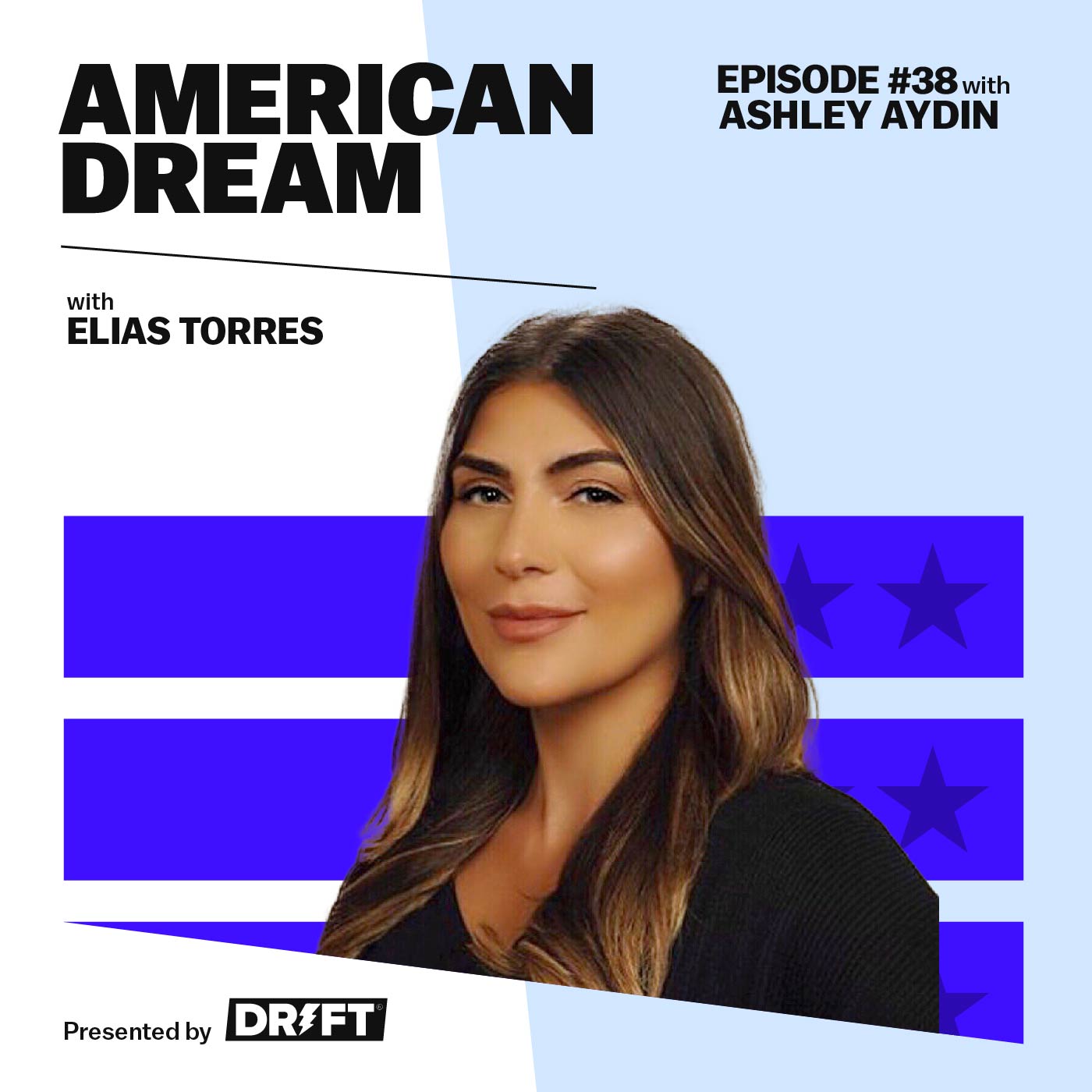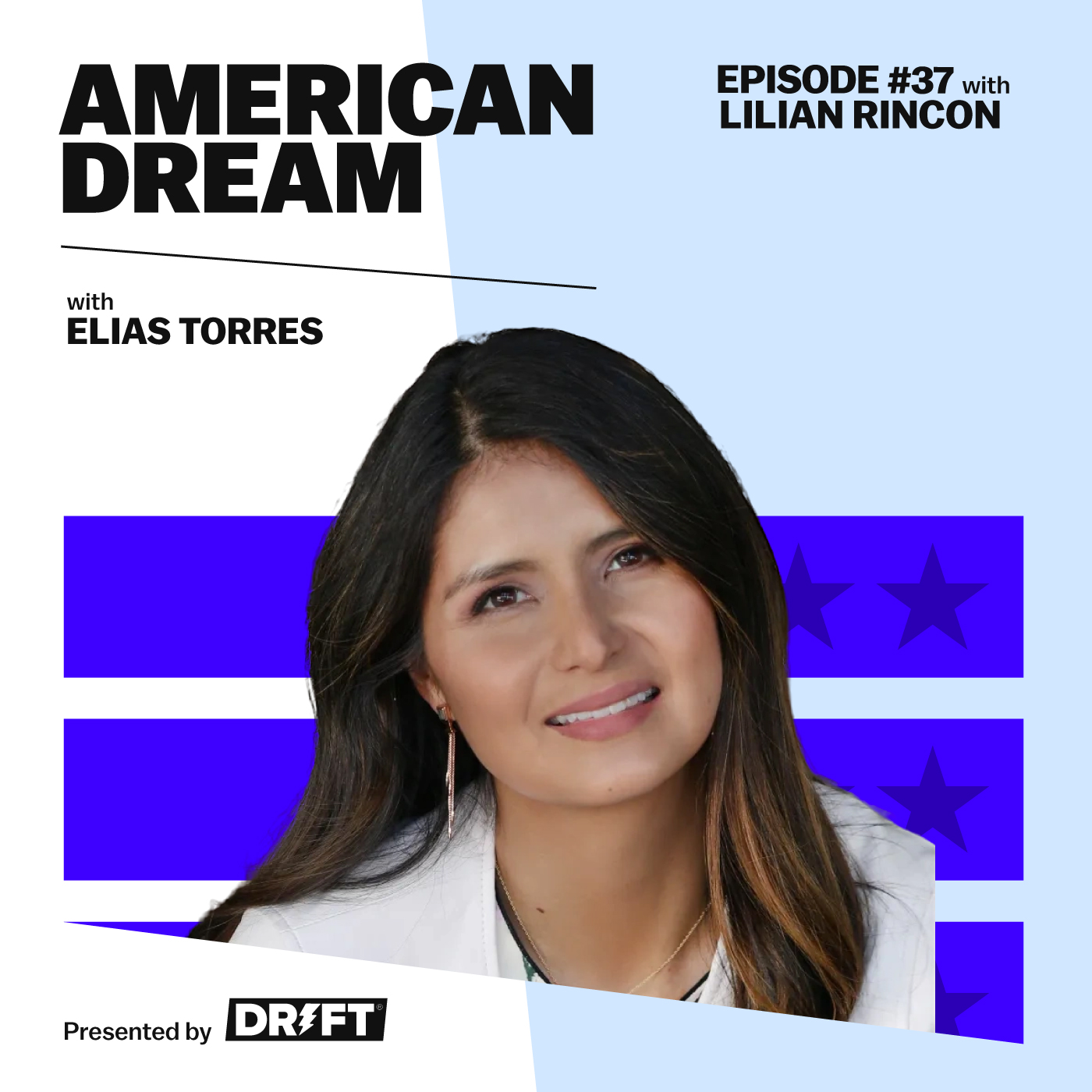Give Each Other Grace, and Work to Make the Process Unfold (Zamawa Arenas, Flowetik)
- 0.5
- 1
- 1.25
- 1.5
- 1.75
- 2
Elias Torres: Hola. I'm Elias Torres, co- founder and CTO of Drift. You are listening to The American Dream podcast. Did you know that Drift is part of just 2% of VC- backed startups led by Latin American founders? Well, I'm on a mission to change that. On this show, you will hear from leaders who have achieved their own version of the American dream. We'll talk about what the process looked like to get there, the obstacles they faced along the way, and the work we still have to do to build the new face of a diverse corporate America. Bienvenidos a todos to the American Dream Podcast. I'm excited to be joined by Zamawa Arenas for this episode. Zamawa is the founder and CEO of Flowetik, a brand marketing consultancy focused on helping leaders of mission- driven organizations scale, and achieve impact through smart, practical brand marketing. Not to mention that Zamawa is also a five- time Emmy award winner. Zamawa defines her ethos as keeping things simple, focused and honest, be kind always, thrive on building long- lasting relationships and helping good people and organizations. Doing good succeeds through the power of collaboration. So, what does this look like in practice and why does it matter? We're going to find out on this episode. Welcome Zamawa, bienvenida.
Zamawa Arenas: Hola, Elias. Gracias. Really happy to be here with you, and it's been a while since we had a chance to spend time together, so I'm excited for this conversation with you.
Elias Torres: It's been fun getting to know you here in the Boston community, and the Latino community. Zamawa's from Venezuela, right? And she's an amazing entrepreneur, that she's very true to her own heart, and her instincts. And let's find out about what's in there. What are those instincts like? You're the CEO of Flowetik. I love to meet Latina, immigrant woman CEO, but tell us a little bit how this started. Where does this entrepreneurial journey begin? Is it in the United States? Or is it in Venezuela?
Zamawa Arenas: Well, I would say that my entrepreneurial spirit started when I was in high school selling bracelets, and having my brother be my salesperson, and building a little enterprise back then. But I came to Boston about 30 years ago to go to grad school, thinking that I would come, get my degree, go back to Venezuela, and continue my career. I was working as a programming director for a cable network. But once I got here, I realized that there were so many opportunities in the US, and the worldwide web, at the time that's what the internet was called, was just really taking off. And I was really intrigued, and I thought, " I can't go back right now. I just want to understand what this is all about. What is this worldwide web? What does it mean given my background in communication?" So, never planned to stay here, but that's how it happened. And I applied for a number of jobs after I graduated from my master's program thinking" I'm cool. People will hire me. I'm bilingual. I know my work," but nobody did. So, I ended up just really turning into an entrepreneur, and tapping into that teenager who was selling bracelets back in Venezuela when she was in high school.
Elias Torres: That's amazing. And it's like every journey is different. I worked for 10 years as full- time, and then I felt like I had to do it. You had no choice. It's really good to see the different things that we have to pay attention that could lead us down the path of our lives. What kind of bracelets were they?
Zamawa Arenas: You know those really hippy bracelets that you would weave, and add little beads? There you go. Exactly those. I can't remember how to make them now, but I made hundreds of those back in the day. But I think it was that-
Elias Torres: Oh, so you were the maker?
Zamawa Arenas: I was making them. I was weaving them, and give my brother a stash, and he would sell them at his school. That's how we did it.
Elias Torres: Yeah, I remember. I used to make them, and you want to make them really tight or really loose, and the patterns, and the diagonals. And-
Zamawa Arenas: Yeah.
Elias Torres: ...there was also somewhere more the lana, the wool ones that had the names. It was like they would go across and then you could make the letters. There was a little plastic thing inside.
Zamawa Arenas: Oh, that was too sophisticated for me. This was a very long time ago. I didn't get that sophisticated.
Elias Torres: I didn't get sophisticated. I did some of those, but my entrepreneurial... I sold mangoes, so you were more advanced than me. I just cut the mangoes from the tree, and I just sold them in the neighborhood.
Zamawa Arenas: That's all it takes.
Elias Torres: That's how I started before computers. So, you came to study. What was the situation in Venezuela? And how does that compare to now?
Zamawa Arenas: Well, the time was 1994, so going back 30 years. That's a long time. And things were just starting to shift. Government was shifting, and things were pretty stable. In my view, I had a really good job. I thought, " I'll do my degree, come back and continue in that career." But when I graduated, and like I said, I was curious about the internet and what that could lead to, I decided that I had to stay, and explore it more just to get to know what the opportunities were. And in hindsight, it was the right thing because after all these years, Venezuela's economy has collapsed and the situation there's really difficult. And my parents are still there. Both my mom and dad, and my sister, and my nephew live in Venezuela. Now that I live here, I've been able to help and support my family from afar. Had I gone back, I don't think I would've had the opportunities to thrive the way I've been able to thrive, and then be a support system for them. It was the right decision at the right time, even though it meant living away from my family, and just establishing myself here in the US.
Elias Torres: Yeah, I think that that's a very powerful thing. In my case, I felt like I came here, and I had no ties back to my country. I disconnected, and never went back. I came in 1993. December 5th I think it was. And I think that you have that. That's something that we as immigrants have to appreciate every single aspect of our lives because that's what mold us or gives us the energy. And all this time, having your family there, must ground you, and must give you such a motivation. I was talking to a young Latina yesterday, that she's trying to figure out whether to go on the entrepreneurial route. And she was like, " Well, it might kill me. It might not be for everybody." And I said, " Stop it. What about our immigrant parents? What about the first generations? What about those people that had to clean the offices, or pick the fruit in the field? We got to go. This is not going to kill us." And you have your family reminding you how tough it is back home, right?
Zamawa Arenas: Yeah. And being an entrepreneur is like jumping out of an airplane without a parachute and figuring it out as you go. And you just got to take the leap. And take a leap of faith, and believe that you can do it. And not be cocky about it, but just be confident that you can survive when you think about all the people around you that you can tap in for support.
Elias Torres: I like that. I think I've done that, but usually we talk about, " Oh, we're entrepreneurs flying a plane, and changing the engine mid- flight while it's flying." This other one's a little bit more drastic like you're jumping without a parachute. It's-
Zamawa Arenas: Well, that was my case. I became an entrepreneur because I couldn't find a full- time job. I didn't know how to become an entrepreneur in Boston. I had no connections, no network, nobody really, but I tried a bunch of things. I failed. Actually, here's a interesting story. I launched a pay- per- view movie service called Eurocinema in 1997. And I was streaming arthouse films online, renting them for$ 2. 95. Buying rights for movies from Europe so that I could stream them online. And I had two guys I was working with, and the Boston Globe interviewed me, and said, " Who's ever going to watch a movie on their computer? That's just never going to work." And this was before there was Hulu, Netflix, any e- commerce platform.
Elias Torres: Of course.
Zamawa Arenas: And of course, we failed because we were way ahead of the time. But all of that taught me that even if your idea feels, like, it's way out there, try it, pursue it. And if you fail, it's not the worst thing in the world. And that's what led me to Argus, the company I ran for 20 years. The path is never a straight path, at least not in my experience, but you have to be open to possibility everywhere, and find that possibility when it's right in front of you.
Elias Torres: Yeah, this is amazing. I'm going to send this podcast to a friend of mine. I was talking to someone I've been mentoring that started a company, and he's stuck. And what should be the next step because he's not quite sure. And I'm like, " You got to do something. You got to try it, and you got to launch it." And I think what you did there, you had no idea if it was going to work, but boy, was it right on the money. And it's like, of streaming videos, getting rights, and you went and got those things. I don't even know how to get the rights of a thing, but you figured all that out, and you did it, and you launched it. And it was not a failure because it led you to start something else. So, tell me about your company. You started a company, Argus, called ThinkArgus now. What was that like? VC, bootstrap, client- supported, your own money, sleeping on the couch, garages. What's the story there?
Zamawa Arenas: Well, the story is that I met a guy who was a graphic designer, and he was thinking of starting a graphic design studio. And this was after Eurocinema was just shutting down. And we started thinking, " What about if we collaborate?" He was creative, I was more on the management side of things at that point, I thought. And 20 years of working really hard, bootstrapped, and we didn't really have any VC or investor money. There were no accelerators or incubators back then, so you really had to figure it out on your own. And slowly and gradually, we built our business around the quality of our work. And for us, it was really important because he's Argentinian, I'm Venezuelan. We were two foreigners building a company with English as our second language. Even making sure that our grammar was right when we sent out emails, making sure that we didn't have any typos as we were putting things together, because we felt like we were being scrutinized more heavily just by virtue of being Latinos with English as a second language. But we were also very clear we didn't want to be hired because we were a Latino- owned company. So somebody could check off the box, and say, " Hey, we hired an MBE, and that's fine." That was really the impetus of making sure that our work was top- notch, that we had great quality, and that clients would want to refer us to others. And that just helped us build the business. And most of our initial clients were in the government space, doing a lot of work in public health, which got me on that path of healthcare, public health work, and mission- based work that I'm so passionate about.
Elias Torres: It is wonderful to hear. There's so many different perspectives. My perspective when I came here was get a job at McDonald's, or get a job at the post office. And you were like, " We have to win by our quality of our works to these clients, then we're going to charge our money." And I commend you for that because you were so much further ahead. I was focused on get a job in this country. You know what I mean? Which put me on the path to get a job. I got a job at IMB. It's like... Yeah.
Zamawa Arenas: Yeah. And I think that's what I mean when you seize opportunity everywhere. It's like that's where you start it, that's where you find your path, and what I call flow, and just go with it.
Elias Torres: Flow, flow, Flowetik. I like it. Poetic. And you being able to spot those trends, not everybody understood the web at that time. I remember in college, forcing everybody to use email, and to go into the library, and log in into the terminal. And they were like, " Why? Just leave me a voicemail. Just call me on the phone."
Zamawa Arenas: Well, you'll appreciate this because literally, after I graduated from my master's program, I got together with a couple of designers to sell website design services back in'97. And we were like, " Of course. You have to have a website. Why not?" And nobody would buy. People were like, " Why would I need a website? What's that going to do for my business? For my organization? We just don't believe in that." Obviously, we just couldn't make it work. But it's just, in hindsight, when you think about it, all the different things that give you signals that there's something here and people ignore it. And then, you realize, oh, we just missed an opportunity. That's why I'm always really anxious for young people who are starting off, don't say no out of the gate. Just be open, and think about what are the possibilities, and what can you make out of whatever circumstances you're dealing with.
Elias Torres: No, amazing. And I feel like I jumped into so many things, but I'm looking at my questions. It says, " Give our listeners an overview on who you are, where you're from, and what you do." And I just jumped into a million other questions. So, you did Argos 20 years. You're CEO now. How did that happen?
Zamawa Arenas: I sold my stake in the company. I decided it was time for me to try my next... Building Argus was remarkable. It was great. But I was just, at a point in my life, I was about to turn 50, and that's a milestone age birthday. And I thought, " This has been amazing, but I want more balance in my life. I want more flexibility, and I want to focus really on a segment of clients that aren't being served by large agencies. And I don't want to have overhead, I don't want to have full- time staff. I want to do this in a different way." So, I built Flowetik with a model of collaboration, and with independent collaborators that I bring in as needed. And they're all intrepid, savvy, super committed, and bring different skillsets. I bring the team, I assemble it for whatever the client needs are, versus trying to fit a staff to meet the needs of a client. So, it gives me a lot of versatility to work with clients across a lot of different issues and causes that I care about.
Elias Torres: I love that. I think that you're a role model to be jobless with a degree, and you start a company, and you put in the time. A lot of people want to be successful, want to be able to do things, but don't want to put the work. I'm on the hard side of that. I tell people, just go to work. This doesn't come easy. I've been working since 17, I'm 47, I've been working for 30 years nonstop. And I like what you've done. That you put yourself in a position now where you understood that you wanted to work the way you wanted. With the companies, with the customers, with the nonprofits that you wanted. And the collaborators, and work your way, and be independent. And that's such a great thing that I think people should aspire to figure out in their lives. And tell us more about what brings you joy there in your job today, and the impact that you can make. Teach us how to make impact.
Zamawa Arenas: I think you can make impact in so many different ways. I'm very passionate about equity, and about racial and social justice. It's been really core to my being, my DNA. And I work with clients who are in education, healthcare, workforce, economic development. All trying to drive change and create a real positive impact in the communities across the state, primarily because I work mostly with Massachusetts- based clients. But I think even if it's moving the needle and increasing Latino representation in schools, that that's a big achievement. While I'm passionate about Latino issues, I work with clients across all different types of communities. And it's really just about helping people tell their story, tell it convincingly, tell it well, and gain support in participation so that they can move their missions, their causes forward in whatever way they can. For me, that's the reward. That's where I see the impact.
Elias Torres: I love that. And I also feel like you do it not only with the nonprofits, but you do it with individuals too. No? I have a few good friends of mine that I feel like you dedicate time in mentorship and availability. From what I know, you're a great human being, and I love that you do that.
Zamawa Arenas: Well, thank you for that. I believe in always being open, and extending a hand to someone to help open doors, and make connections. I really resent leaders who become so closed in, and forget where they come from, and then don't help others get access to connections, opportunities, mentorship. I do believe in just helping young, up and coming leaders who are committed to doing good stuff do what they can to succeed, and learn, and connect.
Elias Torres: And I love seeing that. When younger people come up, and I feel like they have the similar desires that you have, and that raw talent, or that commitment to the community, to the arts, and they see themselves in you. And it's just great to see those connections because sometimes people are like, what do I want to do? And people don't know, but it's always there, it's just we just have to figure out how to see it.
Zamawa Arenas: Yeah, just give it a little nudge.
Elias Torres: Yeah. You're making me feel bad. I wonder what am I becoming because it's hard to talk to everybody. Not trying to sound like a douchebag, but a lot of people want to have time, and I have quality relationships versus sporadic advice. Like bursty. I like to dive in a person, and just stay closer. And it's like, I can't say yes to people because that way I think about commitment. And I called my friend I said that it is starting a company, and we hadn't talked in a few weeks. And I called him, and I'm like, " Get to work. What's happening? Tell me..." And I'm a hard- ass when it comes to advice, but I call him. You know what I mean? And the person's like, " Why don't you help me get me out of this thing?" And I'm like, " Okay, let's do it." But I'd rather go deeper, depth versus breath, but I feel bad to the people that I don't respond, or I say no to.
Zamawa Arenas: Yeah, but I understand. I hear you. You want to have an impact, and if you spread yourself out too thin, then you won't be able to really support in a way that feels right. And that to me, is also important. I serve on a number of nonprofit boards, and I spend my time between my work, my philanthropy, my board involvement, and then the few handful of people that I really care to build a long- term relationship with.
Elias Torres: Yeah, thank you for doing that. Tell me a little bit about... You're on boards, right? What do you need to do to get to be in them? What do you get out of it? What do you give? What is the sacrifice to be on these things? Educate others, so they can maybe see opportunities they have. Maybe we need people in the community joining things, right?
Zamawa Arenas: Yeah. And that honestly was part of what I started when I first got to Boston was like, I don't know people, I don't have a network. And I joined the board of an organization called La Alianza Hispana. And it was a community- based organization, and all I had to contribute was my understanding of communications and marketing. And that was good. I was able to provide some advice and some guidance. But it taught me about what it means to be on a board, is having an opportunity to be at a table, to be able to share your perspective, and help shape policies, or shape strategies that have an impact in the community. Most of my board work is in nonprofit boards, and I had to cut back because I was on way too many, and I was going crazy. But now I'm only on the board of the Boston Foundation, which is a community foundation for Greater Boston, and the board of the Blue Cross Blue Shield of Massachusetts Foundation. And both are really committed to equities. I am at the table, I bring the Latino perspective, which I think is so important to have at all of these different tables of decision making and influence to bring ideas to being solutions, and to make sure that our voice is being heard. And that we are part of the dialogue in the conversations, and that things are not being said about us without us being there. That, to me, is why I joined these kinds of boards, to have direct influence on some decisions that are going to impact the community. Maybe not me directly, but the community at large. And that requires time, that requires commitment, that requires speaking up. Not taking a seat, and not saying anything. And for me, it's not about fame, it's about am I making a difference? And I care. That's why I do it. And it's rewarding, it's challenging, but I wouldn't have it any other way.
Elias Torres: How would you classify yourself? Are you diplomatic? Or are you the table pounder? I would think, it's just a hard role for us as Latinos, whenever we have to speak up and fight, I think for equity. It's like, we can go emotional when people get upset. We're too aggressive, we're too passionate. How do you balance that at boards at this level that have so much money, so much impact, so much visibility? And so many people from the old generations, or from different sectors, or ethnic groups that are just unaware, or don't know yet how to handle this flux in incoming of needs in injustice and inequity?
Zamawa Arenas: Yeah, that's a great question, Elias, because it's something I've been learning over the years. And to me, it's being knowledgeable about the issue. It's being firm when you need to be firm. Being open to ideas, but don't stand back if what you're representing and what you're trying to argue for is grounded in reality and facts, and issues that are important to elevate. People describe me as being firm, balanced and kind. And I'm like, " Okay, I like that." That is my approach to things. And I don't take no easily if I can continue to push, but you also need to understand where other people are coming from. Understanding what their motivations are is really helpful for me to make an counter argument. I listen a lot, and I don't jump to conclusions. I really listen and hear what people are saying. Understand their motivation, why they're asking a question. Not the question itself, but why are they asking the question? And then, I can jump in with my thinking, and my rationale, and that's sort of something I've learned over time. It wasn't something I knew how to do, but it's that muscle that you have to practice.
Elias Torres: No matter how much muscle I spend exercising, nobody's going to call me firm, balanced, and kind. They're giving me other words, definitely. I don't know about the kind one or polite. I can see it though. I can see it in you. Those are definitely three great attributes, and it's good to have you there. It's a lot of time that takes you away from family, and from work, and from life. But I appreciate, more and more I get to interact with people doing this stuff because I've been on the for- profit aspect of things, and just work, work, work. I'm a workaholic. And watch people give their time, and sacrifice their time for the community. As I've learned in this podcast, and people I'm getting to know in organizations, it just teaches me so much. And I respect it, and I appreciate it. What does Zamawa do outside of work? Outside of all this stuff?
Zamawa Arenas: Well, I'm now involved in another initiative that I'm really excited about, and this is another one of my philanthropic volunteer things, which is launching a statewide coalition of Latino leaders to advocate for Latino representation, and economic empowerment for our community in Massachusetts. And I got to brand it. I got to name it Unidos in Power, and it's really about the strength we have as a Latino community in terms of our representation, our potential, our numbers, our youth, and really driving that message so that all the work that I've been doing all these years coalesces around this idea of let's unite, let's come together, and really advocate for the community as a unified force. A lot of us have been doing it independently all by ourselves, sometimes being the only one in the room, the only one at a table. But just imagine the strength of all these voices coming together and advocating on issues that are important to the community, whether it's education, or healthcare, or workforce development. I'm excited about that. We're just starting, and trying to build this coalition. That's one of my volunteer things, but then I also like to practice yoga. I became an abuela, Elias. I'm a grandmother.
Elias Torres: Wow.
Zamawa Arenas: I have a little grandson who's 16 months old, and that brings me so much joy. It's all the heavy stuff that you deal with to try to make a difference in the world. And then, you cuddle up, and snuggle up with a little baby, and he's your grandson, and that's just magical.
Elias Torres: Wow. I'm chasing you. We're similar, but you move fast. I have a inaudible year old, and she's co- op in software right now. She's working full- time while she's going to college, and I'm excited. But no babies yet. But hey, I'm ready. It's my nice-
Zamawa Arenas: She's my stepdaughter. I don't have kids, so I skipped motherhood to become an abuela. I skipped that whole phase of motherhood, but now I get to be an abuela.
Elias Torres: So good. I cannot wait to be... I wish I could have skipped that. It was tough. Yeah, three of them.
Zamawa Arenas: Oh my God.
Elias Torres: Yeah. No, I love that. So, tell me about Unidos in Power. What does success look like? What are examples where you can see this power unify? Making an impact? What do you want to change?
Zamawa Arenas: Well, we're starting and we're building, and part of this is building trust within other community leaders. There's 12 of us on the founding steering committee representing different age groups, sectors, and Boston, and Western Massachusetts. But we know we need to increase more representation around age, and race, and have a really representative steering committee that can help address some of the issues. But success would look like if there's a piece of legislature, or if there's a issue that's affecting the community, that we can rally together as a coalition, and push, and advocate, and call representatives. Get involved, get engaged. To have our voices heard, and to see our Latino community thrive, and have more equitable access to healthcare, to quality education. That's what success looks like, but I feel like a lot of us are doing things on our own. And if we have such incredible numbers in Massachusetts, 13% of the population and growing, what we could do if we could bring our voices together. And really support organizations that are doing the work on the ground, and help move needles, and create the change that everyone wants to see happen. But not feel alone, and that you're fighting the uphill battle on your own.
Elias Torres: Love that. It's to influence the government in Massachusetts, right? To help inaudible equity?
Zamawa Arenas: Influence government, influence corporations, influence business. Representation on all levels, and really thinking about more in the advocacy and policy. This is not about providing direct service, but supporting and giving that civic muscle. Putting it behind organizations that are really doing the work. And doing it a unified and coordinated way that makes people pay attention, and realize, oh yeah, Latinos matter. And we can't succeed in Massachusetts if Latinos don't succeed. That's the bottom line.
Elias Torres: The more muscle we can put in that, the better. It's something that it might be silly to say, but I feel like I just worked really hard always, and more recently starting to realize the power of the network. I just kind of like just grinding. You know what I mean? And then you realize, wow, it's so much easier when you make a phone call. I think I'd heard that from Nicaragua because in Nicaragua everything is that way. You always, have so- and- so call, have so- and- so do this, have so and so... Do you know the right person? And I had that, but then when I came here, I kind of forgot about it. And it's like meritocracy. You work, you receive. And then realized, no, it's the same everywhere, and we don't have the connections. Especially, Latinos. Blacks, they're missing that ability to influence the right person to make the call to risk their authority and their reputation for us. And I think that if I know the people, we have the top people in this organization, in the community here in Boston, that are well connected, and I'm glad that you guys are working together. And let me know how I can help in that because we got to have ways to short circuit this. We can't just keep working hard because I think Latinos have been working hard for too long, and-
Zamawa Arenas: Well, and Latinos are the economic engine in so many ways in terms of the workforce, and the age, and we just need to unify, and come together. And I do think to your point, the network is so important, and that social capital that we don't have as immigrants when we come here. We have to earn it, we have to build it, we have to struggle for it. It's almost like rascar las paredes. You're just trying to build whatever you can. But once you have it, then making really good use of it is so important. And I think people are ready for more collaboration, more partnership just I think the way it should be. And I'm glad to see that there's a group of us, and the group is expanding, and we're all trying to do it for the same goal.
Elias Torres: No, and it's hard. And we need someone like you that is firm, balanced, and kind to keep the group together. Because I think keeping groups together, and aligned, and collaborative requires a special skillset. I'm not good at that. I'm more like command and control. I like your collaborative aspect because people are doing it on their own time. They have a heart for it, but everybody thinks different. It's just hard to keep people rowing in the same direction.
Zamawa Arenas: And you all have different priorities and different times and things like that, but if there's one common value that everyone shares, let's all push towards that value. And then, there will be differences. And one of the things that we've all said is we have to give each other grace. You have to give each other grace. You can't be a hundred percent every day. You can't be a hundred percent all the time, so give each other grace. We all believe that we have to allow the process to unfold. That's been a learning for me. That give each other grace, I think it's so important.
Elias Torres: Yeah, I love that wisdom. That's definitely abuela wisdom right there, but it's so valuable. I think most people don't really understand the meaning of what you just said. It's so deep what you're saying. In relationships, and in work, and collaborative, and in nonprofits, to just understand that people are not going to be a hundred percent what you want them to be, and that we just have to be graceful. I'm learning that. I have friends that are so amazing, but they're annoying me. So many things that bother me, but they love me, and they think about me, and they care about me, and so I have to be graceful. And overcome those things because yet, that person loves me, and I should love them back. It's something that it requires a lot of years of experience to get to that level of wisdom. You're unlocking level nine.
Zamawa Arenas: Yeah, it's like your own video game. You just unlocked a new level, so just go through that door.
Elias Torres: I appreciate those things because before I'm like, " Ah, you're not doing what I need you to do, or you're not acting the way I want to." No, it's hard. It's like, we need to be more patient, more graceful with one another.
Zamawa Arenas: Yeah.
Elias Torres: Well, thank you, Zamawa. This is awesome. Thank you for taking some time, telling your story. I know you're not a TikToker telling every day your story on the social medias out there.
Zamawa Arenas: Well, thank you, Elias. It's been a pleasure to talk with you. And thank you for doing this, and thank you for everything you do, and I hope we continue to cross paths, and collaborate in other things.
Elias Torres: Absolutely. And teach me to be balance... What is it? Balanced, kind, and-
Zamawa Arenas: Yes. Firm, balanced, and kind.
Elias Torres: Yeah.
Zamawa Arenas: You're kind, at least from what I know. You're kind, you're firm, and you're balance, so go for it.
Elias Torres: I don't know about balance. My partner David always says, " There's no such thing as balance." It's like, one days I'm like this. One stage in our lives, we're on this way. And then the other stage of our life, we go the other way. It's hard to be spread thin, and just be perfectly trying to do everything.
Zamawa Arenas: But balance can also be how you hear and accept others, and find balance in what they're doing, and what they're saying. And being also that mediating voice, could also be a way to find balance.
Elias Torres: Look at that. We get to see the balance in action. You just balanced me inaudible. Thank you so much, Zamawa. I hope people enjoyed the podcast. I hope people look up Unidos in Power, and you're in Boston, and people should get involved. Or if not, create a similar initiative in their states, or in the whole country.
Zamawa Arenas: Yep, great.
Elias Torres: Thank you-
Zamawa Arenas: inaudible Well, thank you, Elias. Take care.
Elias Torres: Thanks for listening to The American Dream podcast. Make sure to hit subscribe so you never miss when a new episode drops. If you liked this episode, please leave a six- star review wherever you listen to your podcasts. And if you're interested in learning more about my American dream mission, subscribe to my newsletter linked in the show notes.
DESCRIPTION
"Fair, balanced, and kind."
Those are the three adjectives people most commonly use to describe Zamawa Arenas, Founder & CEO of Flowetik. They're also the adjectives that help Zamawa communicate effectively in the board room.
In this episode of The American Dream, Zamawa explains why she chose to stay in the United States only if she could drive change. She explains how the entrepreneurial journey chose her instead of her choosing it, and the work she does outside of her 9-5 to create more social equity in the United States.
Key Moments:
- (00:00) Introduction
- (02:11) Where did Zamawa’s entrepreneurial spirit begin?
- (05:13) The situation in Venezuela when Zamawa left
- (07:35) Entrepreneurship requires taking a leap of faith
- (10:44) The story behind ThinkArgus
- (15:00) From ThinkArgus to Flowetik
- (17:13) The kind of joy that Flowetik brings to Zamawa
- (20:59) How to figure out where you can really make an impact
- (21:55) What does it really mean to be on a “board”?
- (24:37) How Zamawa communicates effectively on what’s most important to her
- (27:05) What Zamawa does outside of her 9-5
- (29:41) The mission behind Unidos in Power
- (34:58) You have to give each other grace
Like this episode? Leave a review!
Today's Host
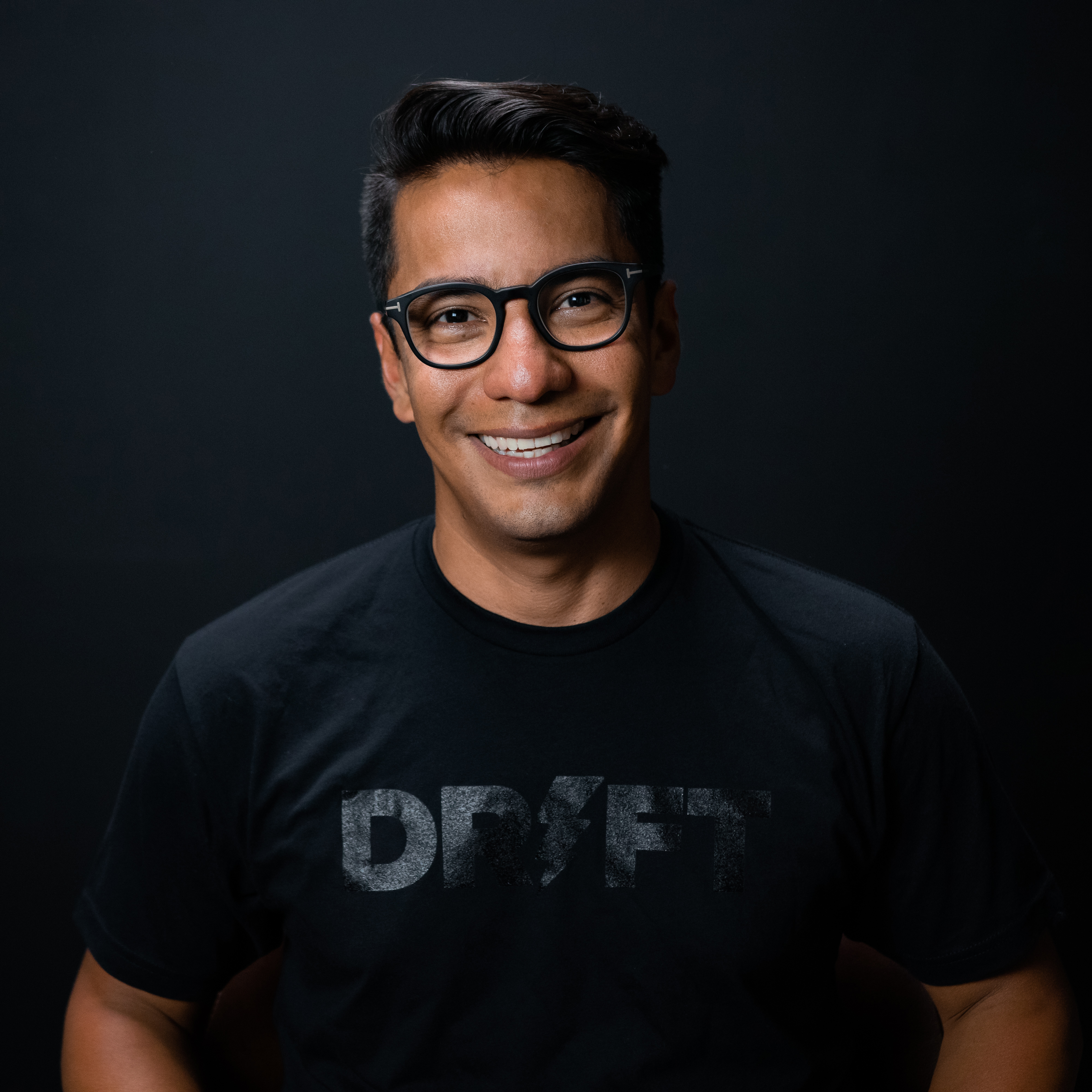
Elias Torres
Today's Guests
